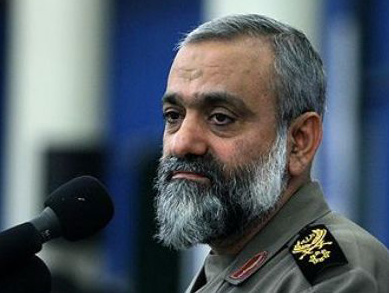Baku, Azerbaijan, Nov. 24
By Dalga Khatinoglu - Trend:
An Iran's top commander said,"nowadays, the most oil and gas flow is under control of the Imam Khamenei's (Iran's Supreme Leader Ayatollah Ali Khamenei) soldiers".
He doesn't clarify that whether "oil and gas flow" implies the Hormuz strait, where some 17 million barrels per day pass through there or not, but Iran had repeatedly threatened to disrupts the oil flow through this strait during Ex-President Mahmoud Ahmadinejad's office.
The Commander of Iran's Basij (volunteer) Force Brigadier General Mohammad Reza Naqdi said on Nov.24, contemporary with Iran, P5+1's nuclear deadline that "Iran does not see whether some (countries) impose the sanctions in Iran or not, "will, they agree (on nuclear talks with Iran" or not, will, they impose sanctions or not", ISNA reported.
Gen.Naqdi added that the most progressive activity in Iran is its defensive military development.
"Iran doesn't need to give them (western countries) and purchase equipment. This is Iran who can close the valves of oil and cripple their economy," he said.
Iran's oil exports had declined from 2 million 2011 to 1.07 million barrels per day in 2013 due to imposed sanctions by the U.S. and EU in mid-2012.
The EU, which shared about 18 percent of Iran's total oil exports (including gas condensate), cut crude oil import from Iran and the Asian customers had had to decrease Iranian oil import every 6 months due to the U.S. sanctions on the Middle Eastern country.
Iran's oil export increased a little to about 1.25 million barrels per day during last nine months.
According to the OPEC monthly statistics, Iraq's oil production has increased from 2.62 million barrels in October 2011 to 3.23 million barrels per day in the same month of 2014. During this period Iran's oil output decreased by 836,000 barrels per day to 2.742 million barrels per day.
General Naqdi's statements came while Iran and P5+1 is negotiating the comprehensive nuclear deal on the last day of scheduled deadline.
Iran and P5+1 (the five permanent members of the UN Security Council comprising of China, France, Russia, Britain, the US Plus Germany) sealed an interim deal in Geneva on November 24, 2013 to pave the way for the full resolution of the West's decade-old dispute with Iran over the country's nuclear energy program.
The Geneva deal took effect on January 20 and expired on July 20. However the two sides agreed to extend their talks for four months until Nov. 24 to reach a permanent deal on Iran's disputed nuclear program.
In exchange for Iran agreeing to limit certain aspects of its nuclear activities, the US and its allies agreed to lift some of the existing sanctions against Tehran.
You can follow the author on Twitter @dalgakhatinoglu






